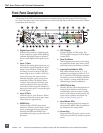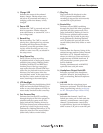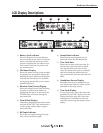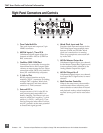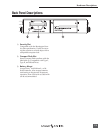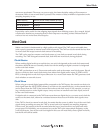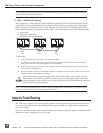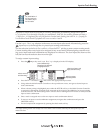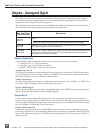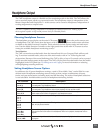
744T User Guide and Technical Information
14
firmware v. 1.04 Features and specifications are subject to change. Visit www.sounddevices.com for the latest documentation.
Input Setup and Control
The 744T has four inputs and four record tracks. Inputs are selectable among analog or digital sourc-
es. Analog inputs 1 and 2 use XLR connectors; analog inputs 3 and 4 use TA3 connections. Digital
inputs can be either AES3 (balanced XLR) or AES3id (BNC) inputs.
One analog pair and one digital pair can be used simultaneously.
Input Source Selection
Input sources are selected in pairs, 1, 2 and 3, 4. Each input pair (1, 2 and 3, 4) accepts analog or digi-
tal audio. The XLR input signal is selected with slide switch above the connector. Inputs 3 and 4 are
selected from the setup menu.
Manually selecting the audio source is used to force the inputs to analog while using an AES3 or
AES3id input to lock the 744T to an external sample rate.
Digital sources connected to AES3id BNC inputs override analog signals on the correspond-
ing XLR input. The BNC input signal type is set in the menu settings Input 1,2: Source and
Input 3,4:Source. For most situations the appropriate setting is auto select—the 744T will choose
the input type based on signal present.
The 744T is capable of off-speed sample rates when clocked from either external digital inputs or the
word clock input.
Input sources can be set to “disabled (power save)”. This option shuts down all circuitry associated
with an input pair to save power and prolong battery life. When an input pair is disabled, the digital
input LEDs associated with the pair will slowly fl ash. In playback-only applications, both input pairs
can be shut down to maximize power-effi ciency and extend battery runtime.
Analog Inputs 1 and 2
Analog inputs 1 and 2, on XLR connectors, are the primary connections into the recorder. These
inputs accept balanced or unbalanced mic- or line-level inputs. Gain control for mic inputs 1 and 2 is
adjusted solely by the front panel push knobs. Gain for the line level inputs can be controlled by the
front panel potentiometers or menu settings. Line input gain is available in 0.1 dB steps.
A digital input present on the BNC inputs will override an analog signal present on the XLR inputs un-
less the input source is set to analog in the setup menu.
In the setup menu, the following functions can be controlled for analog inputs 1 and 2:
Phantom Power (mic- and line-level inputs)
Phantom power (48 volts) can be activated for inputs 1 and 2. When active, phantom is indicated by
front panel LEDs ( ).
Phantom power is available for both mic and line level inputs. Using line-level inputs with microphones
is useful in extreme SPL environments such as concert recording. Make certain to deactivate phantom
power when line level output devices are connected that are susceptible to damage from DC.
Shortcut: To toggle phantom power without entering the menus, press and hold the tone key then
press the menu key for channel 1. Channel 2 phantom can be toggled by pressing the tone key then



